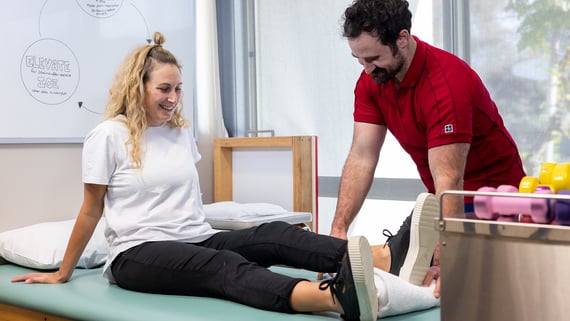Diabetes education
Diabetes education aims to give people who have diabetes, or are at risk of developing it, the knowledge they need to manage their condition.
At Ramsay, our patients are at the heart of everything we do and we’re pleased to offer diabetes education at many of our Ramsay Health Plus clinics and in some of our hospitals.
What is diabetes?
Diabetes is a condition where the level of glucose (sugar) in the blood is too high. This happens when the body doesn't produce enough insulin or can't use it properly, making it harder for glucose to move from the bloodstream into the cells for energy.
There are several types of diabetes, and it can be hereditary. The most common types include:
- Type 1 diabetes: An autoimmune condition where the body produces little to no insulin. It’s usually diagnosed in children and young adults.
- Type 2 diabetes: The most common form, where the body’s cells become resistant to insulin or don’t use it properly. It can develop at any age.
- Gestational diabetes: A type of diabetes that can develop in pregnancy, usually after 24 weeks. It is due to the body’s increased need for insulin at a time when the placenta is also producing hormones that make it harder to process insulin correctly.
Diabetes education overview
Whether you’ve been diagnosed with diabetes or are at risk, learning more about the condition can make a big difference to your health and confidence. Click on the plus sign (+) next to either heading to find out more.
How diabetes education can help
Diabetes education is designed to build confidence and make self-management easier — without feeling overwhelming. Education is tailored to individual needs and can provide support at any stage of the journey.
Support may include:
- understanding your condition and treatment options
- making informed lifestyle changes, including healthy eating
- safely increasing physical activity
- managing medications and insulin
- using monitoring devices like glucometers
- interpreting your blood glucose levels
- managing highs and lows (hypoglycaemia and hyperglycaemia)
- starting insulin pump therapy
- reducing your risk of diabetes-related complications
Potential benefits
Learning to manage diabetes effectively can lead to:
- better physical and emotional wellbeing
- safer, more effective medication use
- sustainable weight loss
- improved overall health and quality of life
Diabetes educators can partner with GPs and any other specialists involved in diabetes care. As a team, they work together to provide comprehensive, tailored support. Other members of a diabetes care team may include an accredited exercise physiologist (AEP), a podiatrist or an accredited practicing dietitian (APD).
If you or someone close to you is adjusting to life with diabetes, support is available and you don’t have to do it alone.
Make an appointment
You don't need a referral to see a diabetes educator. Visit the Ramsay Health Plus website to make an appointment.

Ramsay Newsroom
Stay up-to-date with hospital news, developments, research highlights and innovation.